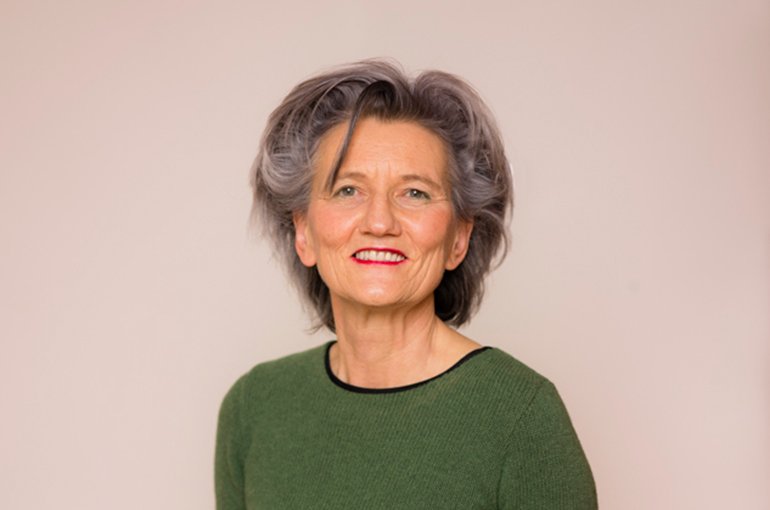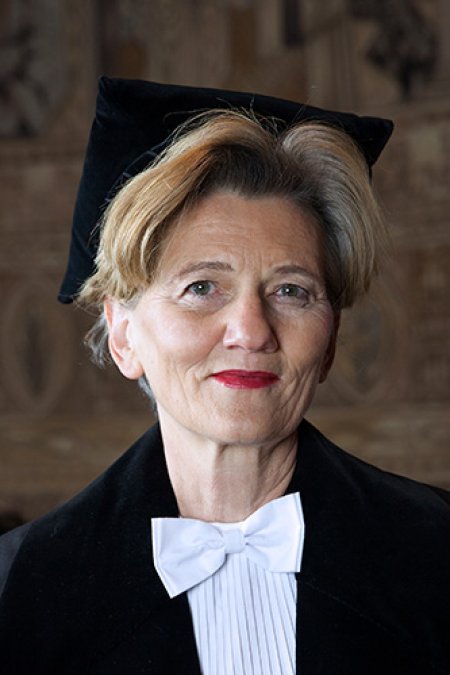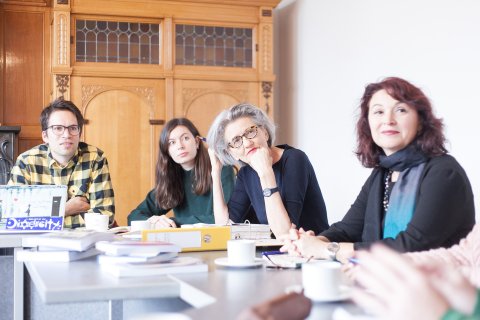Departing Professor Rosemarie Buikema: “Decolonisation does not mean setting fire to a collection”

Professor of Art, Culture and Diversity Rosemarie Buikema will deliver her farewell lecture on 10 October. We meet her between boxes and piles of books in her study on the Muntstraat. “What I have done in my research on feminism, post-colonialism, and now climate change is to show how through the analysis of art, scientific knowledge can somehow be made tangible.” And it shows that she is far from finished doing that.
The important role of arts in political change
Rosemarie Buikema steps down from her role as leader of the Graduate Gender Programme and leader of the Gender, Diversity and Global Justice platform. “Political change requires more than knowledge, lobbying, and activism alone,” she says. “For structural transformation of cultural and social systems that breed inequality and exclusion, the arts have an important role to play.”

“Rational language always falls short. My view on inclusivity is not that all people and perspectives must be precisely categorised and represented. That is by definition impossible. We can, however, learn to question taken-for-grantedness. And that is where the arts can help. Art can evoke an image that you have to work with yourself. Art can cause an experience where, for a moment, the personal coincides with the bigger picture.”
Buikema is realistic about the work still to be done on global justice. “It is en vogue to say that patriarchy, capitalism, and colonialism have brought the planet to the brink of an apocalyse. The common denominator is depletion: the depletion of resources and of people. Wanting control and obliterating other perspectives. Still, I hope things will take a different turn.”
Agency as medicine against fatalism
Having a scope for action is very important, Buikema believes, the fact you know you can do something. “That is the best medicine against fatalism, against thoughts like: let technology solve it, or: it’s too late, everything will go to hell anyway. Art can help shape a sense of alienation and then prompt you to turn this into a scope for action.”
Only when people are moved by images or words do they take action, Buikema observes. “Figures and charts don’t get the attention they deserve, because people simply can’t relate to them. Humanities scholars can mediate between the language of the arts and the language of science.”
It is en vogue to say that patriarchy, capitalism, and colonialism have brought the planet to the brink of an apocalypse.
Apartheid depicted by South African artists
An example of how art can depict and transform social issues, Buikema sees in South Africa, where she lectured and conducted research for years. She wrote extensively about the role of South African artists in making visible previously denied perspectives of apartheid.
“What I have shown is that a whole generation of artists are literally deploying and transforming Truth and Reconciliation Commission data. Wim Botha, for example, works with bibles, encyclopedias, dictionaries, and codes of law – the materials that allowed apartheid to be institutionalised. He cut and pressed these materials together and then sculpted busts of heads of state from it. Botha archives and transforms at the same time. His sculptures acknowledge the facts and in the same process transform the past into something new.”
Giving words to the unsayable
This autumn, Rosemarie Buikema co-curates the exhibition The Elements at Utrecht Centraal Museum with writer and visual artist Manon Uphoff. “In her work, Manon incorporates her past, which includes child abuse. She, too, ploughs through images and language to say something that is almost impossible to say with language. And in doing so, she actually accomplishes the same thing as the South African artists: she takes the unformed material, digs through it, and emerges with new images and new words. She shapes the unsayable.”
Strategic alliances
With the guest curatorship and her work for the international and interdisciplinary project RE-WIRING, Buikema will continue after her retirement. But her leadership role of one of the university’s strategic themes has come to an end. In an interdisciplinary collaboration under the title Gender, Diversity and Global Justice, together with Linda Senden and Belle Derks, she devoted herself for years to equality and emancipation of marginalised groups in society.
“For us, Utrecht University’s interdisciplinary research platforms were right on time, not a day too soon. We were impatient, both my group in Gender Studies and the groups in the Law and Social Sciences faculties. We had been eager to see our knowledge translated into national policy for some time. Boosted by #metoo and Black Lives Matter, the momentum was there. Now we train cultural and civil society organisations and advise ministries and other policymakers on inclusive communication and policy.”
“This is the inspiring thing about interdisciplinary collaboration: your own little kick against the ball suddenly turns out to be part of a game in which you can all score a goal together.”
Decolonising museums without banning entire collections

Buikema also remains associated with the Museum of Equality and Difference (MOED), an online museum and research project that focuses on the representation of equality and difference. “Museums wanted to decolonise and become accessible to wider audiences. I thought: we need to show how to do that, decolonising.”
“Decolonising and making collections more inclusive does not mean that the whole collection has to go,” Buikema says. “No, you don’t have to set fire to your collection. MOED’s starting point is: we use what is there, because you have never shown all aspects of every piece. You can decolonise a museum with the collection that is present. You can present the collection in a different way and add new objects, for instance.”
Gender Studies has been given the opportunity it deserves
Buikema confidently leaves the leadership of Gender Studies. “One of the things I am grateful for is that Utrecht University in a broad sense has always encouraged the development of Gender Studies. We were given opportunities to experiment and grow. This also allowed us to build a strong and diverse team and it gave us a leading role in the field. It is very comforting to know that a new generation of talented scholars is ready to further strengthen and renew the field.”

